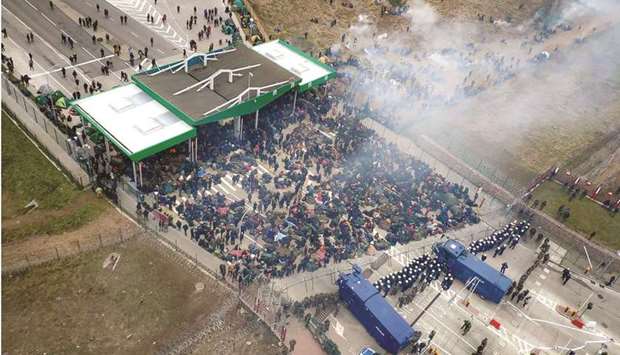The European Union vowed yesterday to press ahead with sanctions targeting the regime of Belarus President Alexander Lukashenko, as migrants massed at the Polish border despite Minsk claiming it was trying to repatriate them.
“Attention, attention: illegal border crossing is forbidden. You will face criminal charges,” blared out from Polish loudspeakers, as hundreds of mainly Middle Eastern travellers set up tents at the Bruzgi border post.
Belarus forces had channelled the crowd towards the last line of Polish razor wire, but they were brought up short by the police cordon before they could cross onto EU soil, and the stand-off continued.
In Brussels, EU foreign ministers met and agreed that their existing sanctions regime targeting Lukashenko and his allies will be expanded to include individuals or companies found to have encouraged border crossings.
No new names were added to the sanctions list, but EU foreign policy chief Josep Borrell said this would be done in the “coming days”.
After meeting the ministers, Borrell said the new sanctions would hit “quite an important number” of individuals and entities for “facilitating illegal border crossings into the EU”.
“By expanding the scope of the sanctions we will be able to target those responsible for exploiting vulnerable migrants,” Borrell said.
Diplomats said the new penalties are expected to target around 30 Belarusian officials, the state airline and travel agencies.
Migrants have been trying to cross from Belarus into EU member Poland for months, but tensions soared last week as co-ordinated efforts to cross were turned back by Polish border guards.
The EU accuses Belarus of sending the migrants to the border as retribution for earlier sanctions, but the threat of further measures moved Lukashenko to offer an apparent olive branch.
He said Belarus did not want the border situation to escalate into a “conflict” and that it was working to send home the several thousand migrants camping on its wooded border with Poland in damp and freezing conditions.
“Active work is underway in this area, to convince people — please, return home. But nobody wants to go back,” Lukashenko said, as quoted by state news agency Belta.
But Lithuanian Foreign Minister Gabrielius Landsbergis, speaking for many of the 27 EU governments, said Brussels had “no reason” to believe Lukashenko. The Belarusian leader also suggested that, if Poland does not provide a “humanitarian corridor”, Minsk could ferry the migrants to Germany via its state-run airline Belavia.
“We will send them to Munich by our own planes, if necessary,” Lukashenko said.
Poland said yesterday that Belarusian forces were bringing groups of migrants to the Kuznica border crossing, and Warsaw’s interior ministry announced it would start building a border wall next month.
Belarus’ state border committee rejected the accusation, saying the migrants had “self-organised” and that Belarusian border guards were present to “ensure safety”.
Lukashenko denies accusations that he has organised the migrants on the border, saying yesterday the situation was proving “expensive” for his country.
And he repeated warnings that Belarus would defend itself if new sanctions are imposed.
Belarus has faced waves of EU sanctions in response to a crackdown on the opposition after last year’s presidential elections and Lukashenko’s decision to ground a Ryanair flight in Minsk earlier this year to detain an activist.
Lukashenko has so far weathered Belarus’s growing isolation with the help of his main political and financial backer Moscow, and the Kremlin continued to defend the Belarusian leader.
“Lukashenko is not creating the situation that is taking place at the border,” Kremlin spokesman Dmitry Peskov told reporters. Belarus says there are about 2,000 people in the migrant camp, including pregnant women and children, while Poland says there are between 3,000 and 4,000 migrants on the border.
Poland has refused to allow the migrants in — detaining 50 on Sunday after they entered the country — and has accused Belarus of preventing them from leaving.

Polish police block migrants who gather on the Belarusian-Polish border in an attempt to cross it at the Kuznica Bialostocka-Bruzgi border crossing, Poland, yesterday. (Reuters)
